Report on Adidas: Supply Chain Management Analysis and Strategies
VerifiedAdded on 2020/05/01
|11
|3019
|1772
Report
AI Summary
This report examines the supply chain management of Adidas, a major sportswear manufacturer. It explores the key flows, including product, information, and cash flow, and analyzes their impact on the company's revenue and profit. The report details the production planning process, including material requirement planning (MRP), and provides recommendations for improvement. Furthermore, it investigates Adidas's demand planning and forecasting strategies, highlighting the use of technology and various forecasting models. The analysis emphasizes the importance of effective supply chain management for maintaining a competitive edge and meeting customer needs. The report concludes with recommendations for optimizing the supply chain, including marketing strategies, technology adoption, and inventory management practices, to ensure continued growth and success.
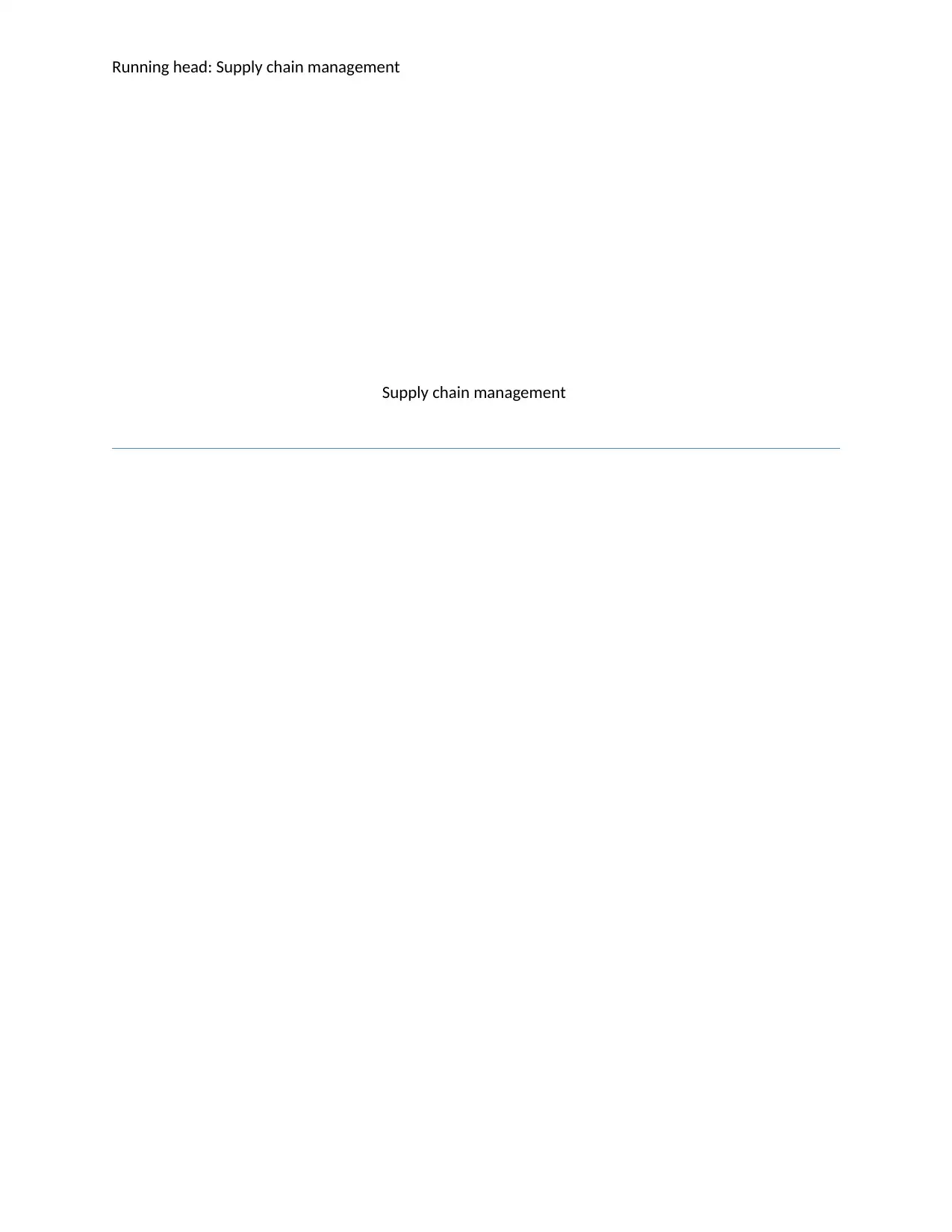
Running head: Supply chain management
Supply chain management
Supply chain management
Paraphrase This Document
Need a fresh take? Get an instant paraphrase of this document with our AI Paraphraser
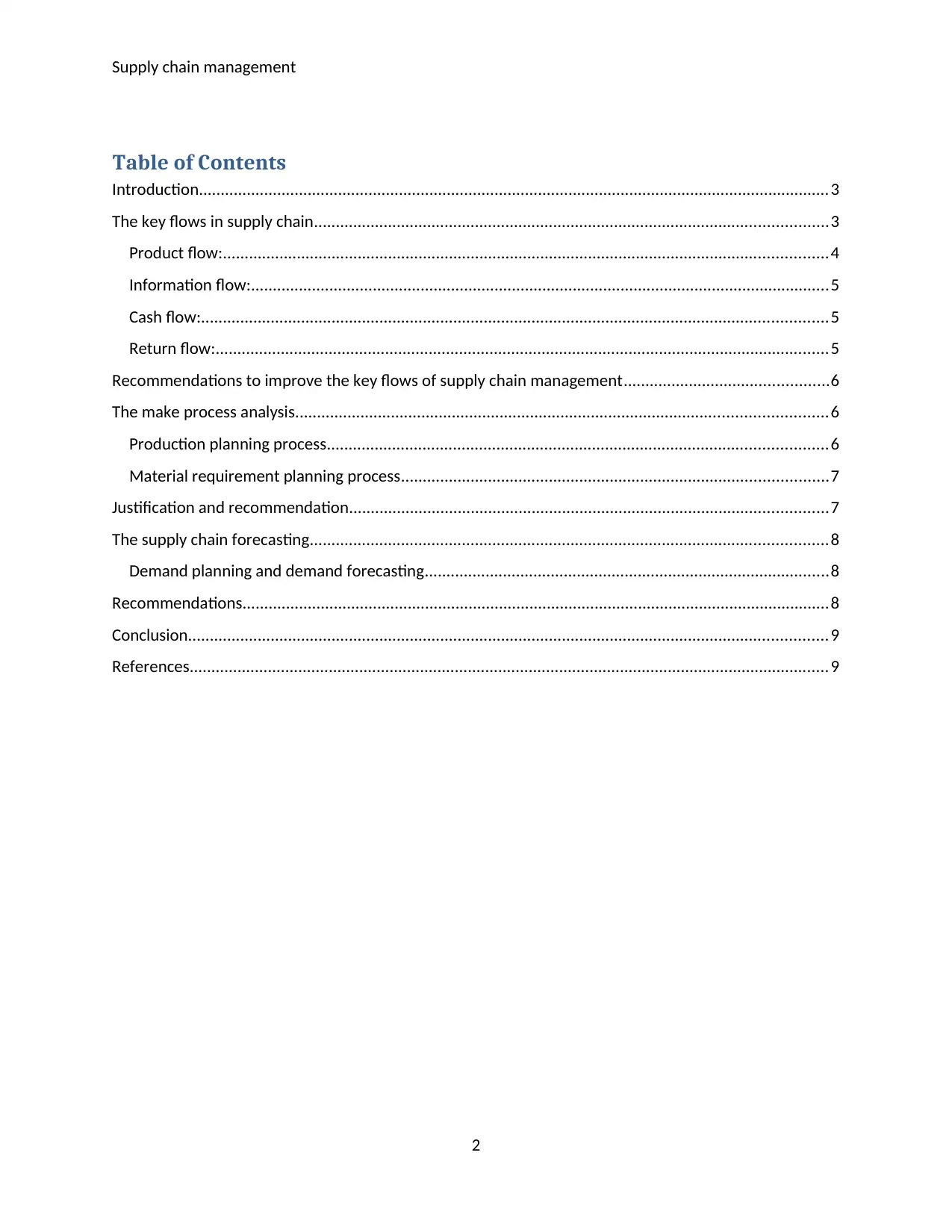
Supply chain management
Table of Contents
Introduction.................................................................................................................................................3
The key flows in supply chain......................................................................................................................3
Product flow:...........................................................................................................................................4
Information flow:.....................................................................................................................................5
Cash flow:................................................................................................................................................5
Return flow:.............................................................................................................................................5
Recommendations to improve the key flows of supply chain management...............................................6
The make process analysis..........................................................................................................................6
Production planning process...................................................................................................................6
Material requirement planning process..................................................................................................7
Justification and recommendation..............................................................................................................7
The supply chain forecasting.......................................................................................................................8
Demand planning and demand forecasting.............................................................................................8
Recommendations.......................................................................................................................................8
Conclusion...................................................................................................................................................9
References...................................................................................................................................................9
2
Table of Contents
Introduction.................................................................................................................................................3
The key flows in supply chain......................................................................................................................3
Product flow:...........................................................................................................................................4
Information flow:.....................................................................................................................................5
Cash flow:................................................................................................................................................5
Return flow:.............................................................................................................................................5
Recommendations to improve the key flows of supply chain management...............................................6
The make process analysis..........................................................................................................................6
Production planning process...................................................................................................................6
Material requirement planning process..................................................................................................7
Justification and recommendation..............................................................................................................7
The supply chain forecasting.......................................................................................................................8
Demand planning and demand forecasting.............................................................................................8
Recommendations.......................................................................................................................................8
Conclusion...................................................................................................................................................9
References...................................................................................................................................................9
2
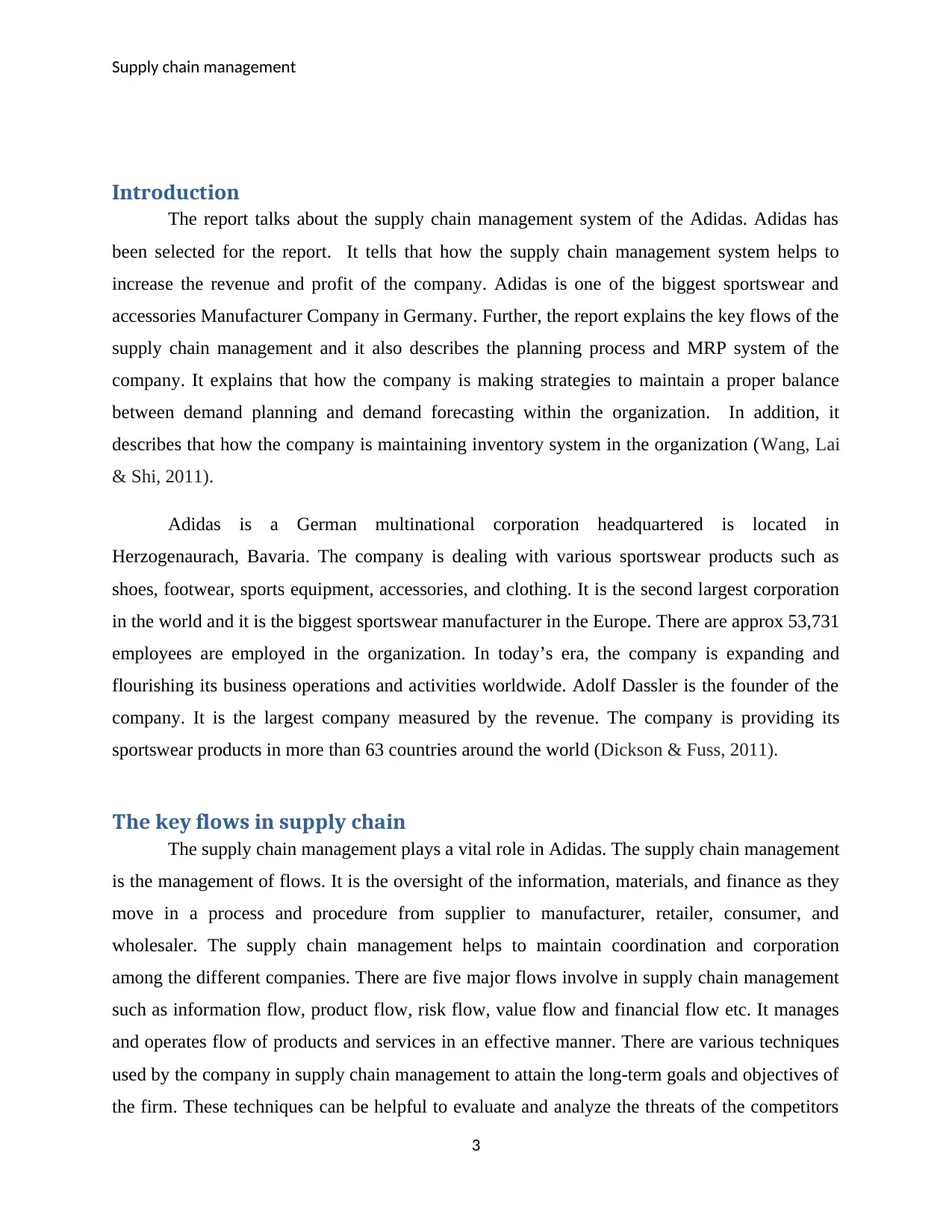
Supply chain management
Introduction
The report talks about the supply chain management system of the Adidas. Adidas has
been selected for the report. It tells that how the supply chain management system helps to
increase the revenue and profit of the company. Adidas is one of the biggest sportswear and
accessories Manufacturer Company in Germany. Further, the report explains the key flows of the
supply chain management and it also describes the planning process and MRP system of the
company. It explains that how the company is making strategies to maintain a proper balance
between demand planning and demand forecasting within the organization. In addition, it
describes that how the company is maintaining inventory system in the organization (Wang, Lai
& Shi, 2011).
Adidas is a German multinational corporation headquartered is located in
Herzogenaurach, Bavaria. The company is dealing with various sportswear products such as
shoes, footwear, sports equipment, accessories, and clothing. It is the second largest corporation
in the world and it is the biggest sportswear manufacturer in the Europe. There are approx 53,731
employees are employed in the organization. In today’s era, the company is expanding and
flourishing its business operations and activities worldwide. Adolf Dassler is the founder of the
company. It is the largest company measured by the revenue. The company is providing its
sportswear products in more than 63 countries around the world (Dickson & Fuss, 2011).
The key flows in supply chain
The supply chain management plays a vital role in Adidas. The supply chain management
is the management of flows. It is the oversight of the information, materials, and finance as they
move in a process and procedure from supplier to manufacturer, retailer, consumer, and
wholesaler. The supply chain management helps to maintain coordination and corporation
among the different companies. There are five major flows involve in supply chain management
such as information flow, product flow, risk flow, value flow and financial flow etc. It manages
and operates flow of products and services in an effective manner. There are various techniques
used by the company in supply chain management to attain the long-term goals and objectives of
the firm. These techniques can be helpful to evaluate and analyze the threats of the competitors
3
Introduction
The report talks about the supply chain management system of the Adidas. Adidas has
been selected for the report. It tells that how the supply chain management system helps to
increase the revenue and profit of the company. Adidas is one of the biggest sportswear and
accessories Manufacturer Company in Germany. Further, the report explains the key flows of the
supply chain management and it also describes the planning process and MRP system of the
company. It explains that how the company is making strategies to maintain a proper balance
between demand planning and demand forecasting within the organization. In addition, it
describes that how the company is maintaining inventory system in the organization (Wang, Lai
& Shi, 2011).
Adidas is a German multinational corporation headquartered is located in
Herzogenaurach, Bavaria. The company is dealing with various sportswear products such as
shoes, footwear, sports equipment, accessories, and clothing. It is the second largest corporation
in the world and it is the biggest sportswear manufacturer in the Europe. There are approx 53,731
employees are employed in the organization. In today’s era, the company is expanding and
flourishing its business operations and activities worldwide. Adolf Dassler is the founder of the
company. It is the largest company measured by the revenue. The company is providing its
sportswear products in more than 63 countries around the world (Dickson & Fuss, 2011).
The key flows in supply chain
The supply chain management plays a vital role in Adidas. The supply chain management
is the management of flows. It is the oversight of the information, materials, and finance as they
move in a process and procedure from supplier to manufacturer, retailer, consumer, and
wholesaler. The supply chain management helps to maintain coordination and corporation
among the different companies. There are five major flows involve in supply chain management
such as information flow, product flow, risk flow, value flow and financial flow etc. It manages
and operates flow of products and services in an effective manner. There are various techniques
used by the company in supply chain management to attain the long-term goals and objectives of
the firm. These techniques can be helpful to evaluate and analyze the threats of the competitors
3
⊘ This is a preview!⊘
Do you want full access?
Subscribe today to unlock all pages.

Trusted by 1+ million students worldwide
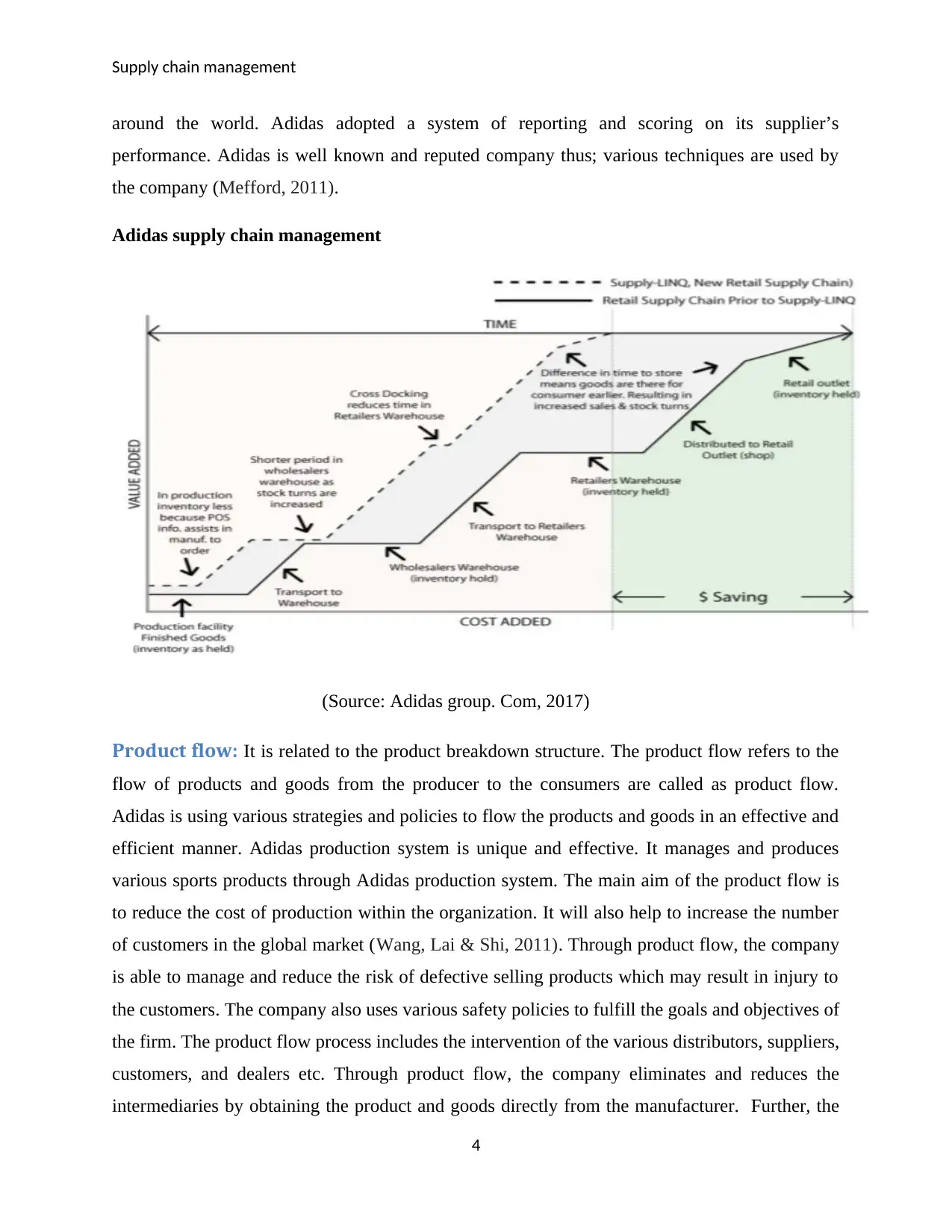
Supply chain management
around the world. Adidas adopted a system of reporting and scoring on its supplier’s
performance. Adidas is well known and reputed company thus; various techniques are used by
the company (Mefford, 2011).
Adidas supply chain management
(Source: Adidas group. Com, 2017)
Product flow: It is related to the product breakdown structure. The product flow refers to the
flow of products and goods from the producer to the consumers are called as product flow.
Adidas is using various strategies and policies to flow the products and goods in an effective and
efficient manner. Adidas production system is unique and effective. It manages and produces
various sports products through Adidas production system. The main aim of the product flow is
to reduce the cost of production within the organization. It will also help to increase the number
of customers in the global market (Wang, Lai & Shi, 2011). Through product flow, the company
is able to manage and reduce the risk of defective selling products which may result in injury to
the customers. The company also uses various safety policies to fulfill the goals and objectives of
the firm. The product flow process includes the intervention of the various distributors, suppliers,
customers, and dealers etc. Through product flow, the company eliminates and reduces the
intermediaries by obtaining the product and goods directly from the manufacturer. Further, the
4
around the world. Adidas adopted a system of reporting and scoring on its supplier’s
performance. Adidas is well known and reputed company thus; various techniques are used by
the company (Mefford, 2011).
Adidas supply chain management
(Source: Adidas group. Com, 2017)
Product flow: It is related to the product breakdown structure. The product flow refers to the
flow of products and goods from the producer to the consumers are called as product flow.
Adidas is using various strategies and policies to flow the products and goods in an effective and
efficient manner. Adidas production system is unique and effective. It manages and produces
various sports products through Adidas production system. The main aim of the product flow is
to reduce the cost of production within the organization. It will also help to increase the number
of customers in the global market (Wang, Lai & Shi, 2011). Through product flow, the company
is able to manage and reduce the risk of defective selling products which may result in injury to
the customers. The company also uses various safety policies to fulfill the goals and objectives of
the firm. The product flow process includes the intervention of the various distributors, suppliers,
customers, and dealers etc. Through product flow, the company eliminates and reduces the
intermediaries by obtaining the product and goods directly from the manufacturer. Further, the
4
Paraphrase This Document
Need a fresh take? Get an instant paraphrase of this document with our AI Paraphraser
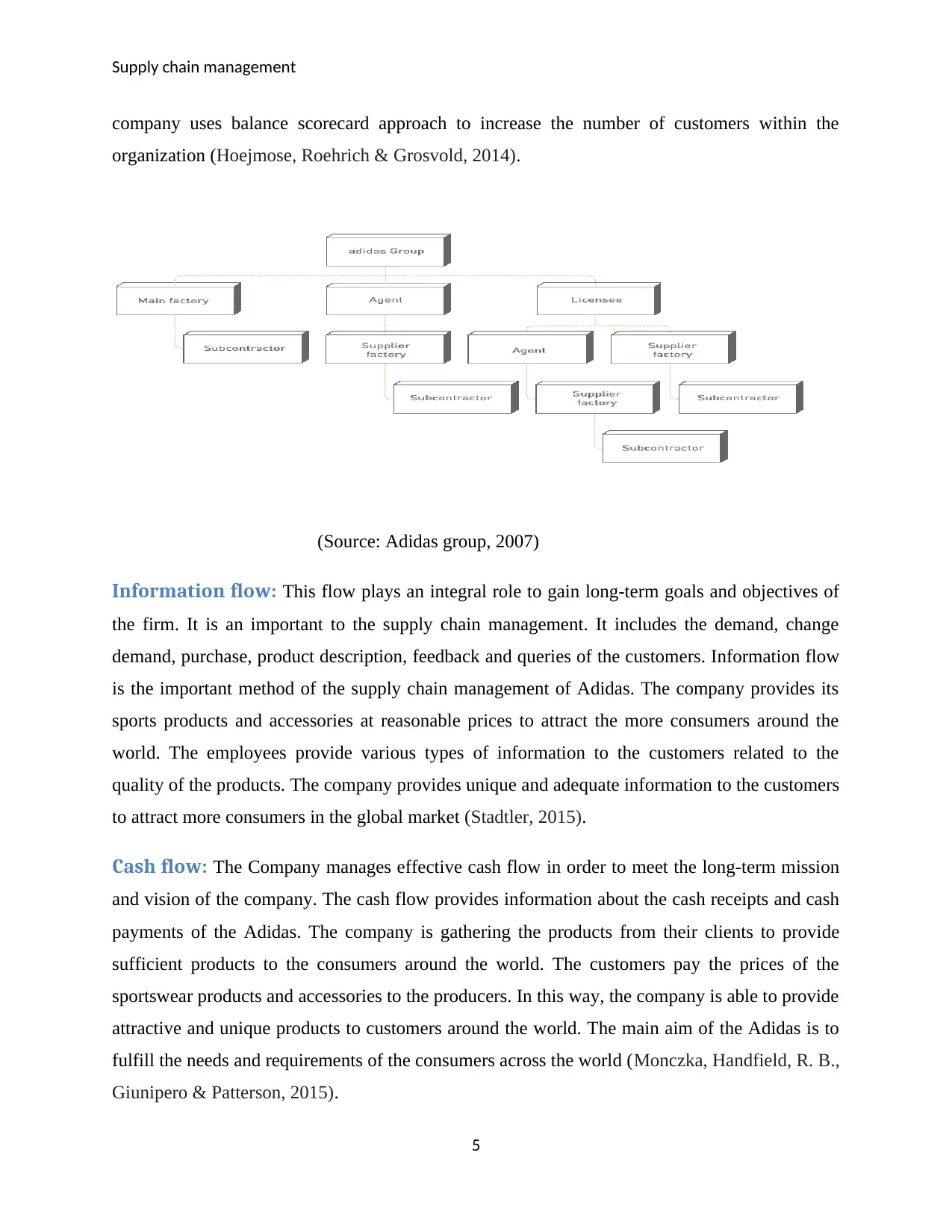
Supply chain management
company uses balance scorecard approach to increase the number of customers within the
organization (Hoejmose, Roehrich & Grosvold, 2014).
(Source: Adidas group, 2007)
Information flow: This flow plays an integral role to gain long-term goals and objectives of
the firm. It is an important to the supply chain management. It includes the demand, change
demand, purchase, product description, feedback and queries of the customers. Information flow
is the important method of the supply chain management of Adidas. The company provides its
sports products and accessories at reasonable prices to attract the more consumers around the
world. The employees provide various types of information to the customers related to the
quality of the products. The company provides unique and adequate information to the customers
to attract more consumers in the global market (Stadtler, 2015).
Cash flow: The Company manages effective cash flow in order to meet the long-term mission
and vision of the company. The cash flow provides information about the cash receipts and cash
payments of the Adidas. The company is gathering the products from their clients to provide
sufficient products to the consumers around the world. The customers pay the prices of the
sportswear products and accessories to the producers. In this way, the company is able to provide
attractive and unique products to customers around the world. The main aim of the Adidas is to
fulfill the needs and requirements of the consumers across the world (Monczka, Handfield, R. B.,
Giunipero & Patterson, 2015).
5
company uses balance scorecard approach to increase the number of customers within the
organization (Hoejmose, Roehrich & Grosvold, 2014).
(Source: Adidas group, 2007)
Information flow: This flow plays an integral role to gain long-term goals and objectives of
the firm. It is an important to the supply chain management. It includes the demand, change
demand, purchase, product description, feedback and queries of the customers. Information flow
is the important method of the supply chain management of Adidas. The company provides its
sports products and accessories at reasonable prices to attract the more consumers around the
world. The employees provide various types of information to the customers related to the
quality of the products. The company provides unique and adequate information to the customers
to attract more consumers in the global market (Stadtler, 2015).
Cash flow: The Company manages effective cash flow in order to meet the long-term mission
and vision of the company. The cash flow provides information about the cash receipts and cash
payments of the Adidas. The company is gathering the products from their clients to provide
sufficient products to the consumers around the world. The customers pay the prices of the
sportswear products and accessories to the producers. In this way, the company is able to provide
attractive and unique products to customers around the world. The main aim of the Adidas is to
fulfill the needs and requirements of the consumers across the world (Monczka, Handfield, R. B.,
Giunipero & Patterson, 2015).
5
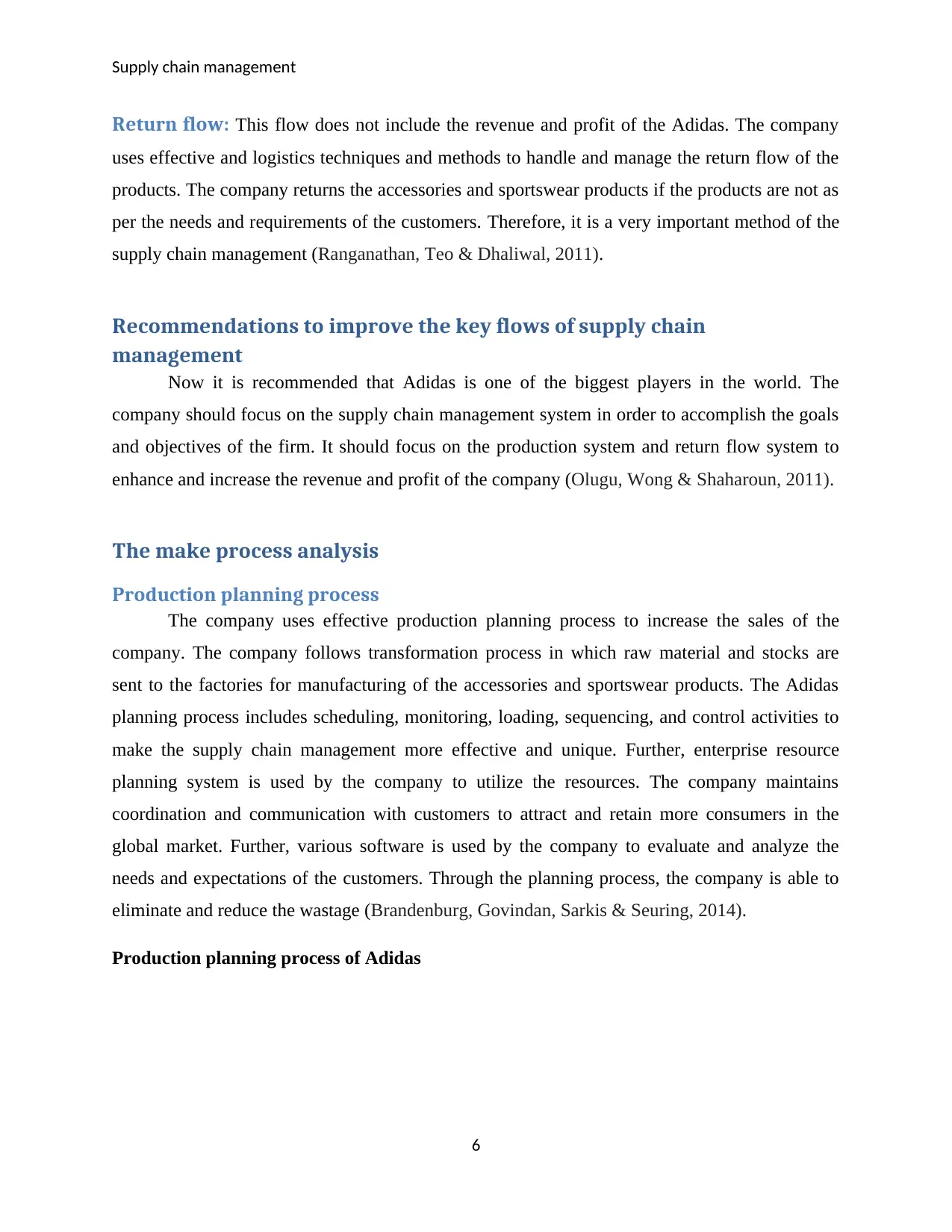
Supply chain management
Return flow: This flow does not include the revenue and profit of the Adidas. The company
uses effective and logistics techniques and methods to handle and manage the return flow of the
products. The company returns the accessories and sportswear products if the products are not as
per the needs and requirements of the customers. Therefore, it is a very important method of the
supply chain management (Ranganathan, Teo & Dhaliwal, 2011).
Recommendations to improve the key flows of supply chain
management
Now it is recommended that Adidas is one of the biggest players in the world. The
company should focus on the supply chain management system in order to accomplish the goals
and objectives of the firm. It should focus on the production system and return flow system to
enhance and increase the revenue and profit of the company (Olugu, Wong & Shaharoun, 2011).
The make process analysis
Production planning process
The company uses effective production planning process to increase the sales of the
company. The company follows transformation process in which raw material and stocks are
sent to the factories for manufacturing of the accessories and sportswear products. The Adidas
planning process includes scheduling, monitoring, loading, sequencing, and control activities to
make the supply chain management more effective and unique. Further, enterprise resource
planning system is used by the company to utilize the resources. The company maintains
coordination and communication with customers to attract and retain more consumers in the
global market. Further, various software is used by the company to evaluate and analyze the
needs and expectations of the customers. Through the planning process, the company is able to
eliminate and reduce the wastage (Brandenburg, Govindan, Sarkis & Seuring, 2014).
Production planning process of Adidas
6
Return flow: This flow does not include the revenue and profit of the Adidas. The company
uses effective and logistics techniques and methods to handle and manage the return flow of the
products. The company returns the accessories and sportswear products if the products are not as
per the needs and requirements of the customers. Therefore, it is a very important method of the
supply chain management (Ranganathan, Teo & Dhaliwal, 2011).
Recommendations to improve the key flows of supply chain
management
Now it is recommended that Adidas is one of the biggest players in the world. The
company should focus on the supply chain management system in order to accomplish the goals
and objectives of the firm. It should focus on the production system and return flow system to
enhance and increase the revenue and profit of the company (Olugu, Wong & Shaharoun, 2011).
The make process analysis
Production planning process
The company uses effective production planning process to increase the sales of the
company. The company follows transformation process in which raw material and stocks are
sent to the factories for manufacturing of the accessories and sportswear products. The Adidas
planning process includes scheduling, monitoring, loading, sequencing, and control activities to
make the supply chain management more effective and unique. Further, enterprise resource
planning system is used by the company to utilize the resources. The company maintains
coordination and communication with customers to attract and retain more consumers in the
global market. Further, various software is used by the company to evaluate and analyze the
needs and expectations of the customers. Through the planning process, the company is able to
eliminate and reduce the wastage (Brandenburg, Govindan, Sarkis & Seuring, 2014).
Production planning process of Adidas
6
⊘ This is a preview!⊘
Do you want full access?
Subscribe today to unlock all pages.

Trusted by 1+ million students worldwide
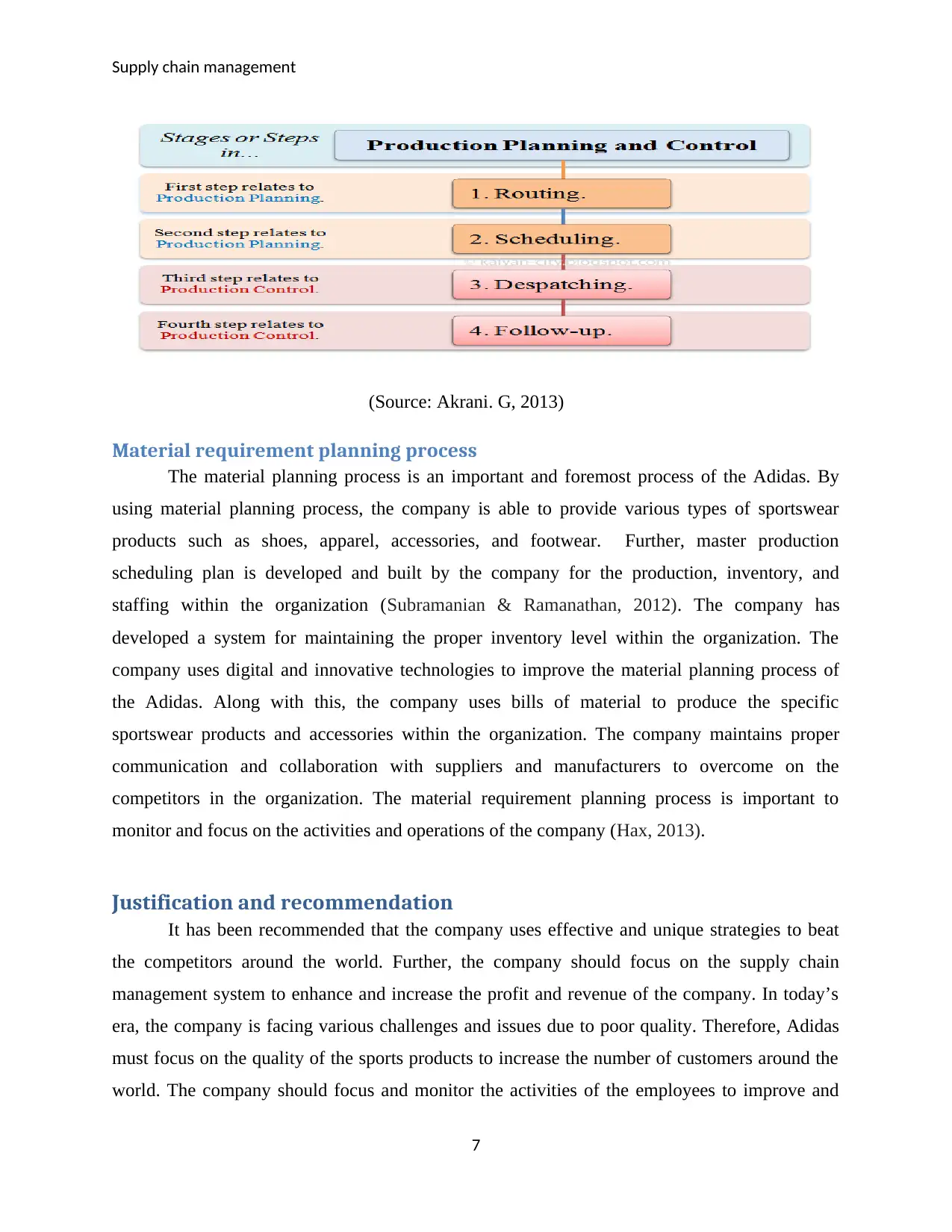
Supply chain management
(Source: Akrani. G, 2013)
Material requirement planning process
The material planning process is an important and foremost process of the Adidas. By
using material planning process, the company is able to provide various types of sportswear
products such as shoes, apparel, accessories, and footwear. Further, master production
scheduling plan is developed and built by the company for the production, inventory, and
staffing within the organization (Subramanian & Ramanathan, 2012). The company has
developed a system for maintaining the proper inventory level within the organization. The
company uses digital and innovative technologies to improve the material planning process of
the Adidas. Along with this, the company uses bills of material to produce the specific
sportswear products and accessories within the organization. The company maintains proper
communication and collaboration with suppliers and manufacturers to overcome on the
competitors in the organization. The material requirement planning process is important to
monitor and focus on the activities and operations of the company (Hax, 2013).
Justification and recommendation
It has been recommended that the company uses effective and unique strategies to beat
the competitors around the world. Further, the company should focus on the supply chain
management system to enhance and increase the profit and revenue of the company. In today’s
era, the company is facing various challenges and issues due to poor quality. Therefore, Adidas
must focus on the quality of the sports products to increase the number of customers around the
world. The company should focus and monitor the activities of the employees to improve and
7
(Source: Akrani. G, 2013)
Material requirement planning process
The material planning process is an important and foremost process of the Adidas. By
using material planning process, the company is able to provide various types of sportswear
products such as shoes, apparel, accessories, and footwear. Further, master production
scheduling plan is developed and built by the company for the production, inventory, and
staffing within the organization (Subramanian & Ramanathan, 2012). The company has
developed a system for maintaining the proper inventory level within the organization. The
company uses digital and innovative technologies to improve the material planning process of
the Adidas. Along with this, the company uses bills of material to produce the specific
sportswear products and accessories within the organization. The company maintains proper
communication and collaboration with suppliers and manufacturers to overcome on the
competitors in the organization. The material requirement planning process is important to
monitor and focus on the activities and operations of the company (Hax, 2013).
Justification and recommendation
It has been recommended that the company uses effective and unique strategies to beat
the competitors around the world. Further, the company should focus on the supply chain
management system to enhance and increase the profit and revenue of the company. In today’s
era, the company is facing various challenges and issues due to poor quality. Therefore, Adidas
must focus on the quality of the sports products to increase the number of customers around the
world. The company should focus and monitor the activities of the employees to improve and
7
Paraphrase This Document
Need a fresh take? Get an instant paraphrase of this document with our AI Paraphraser
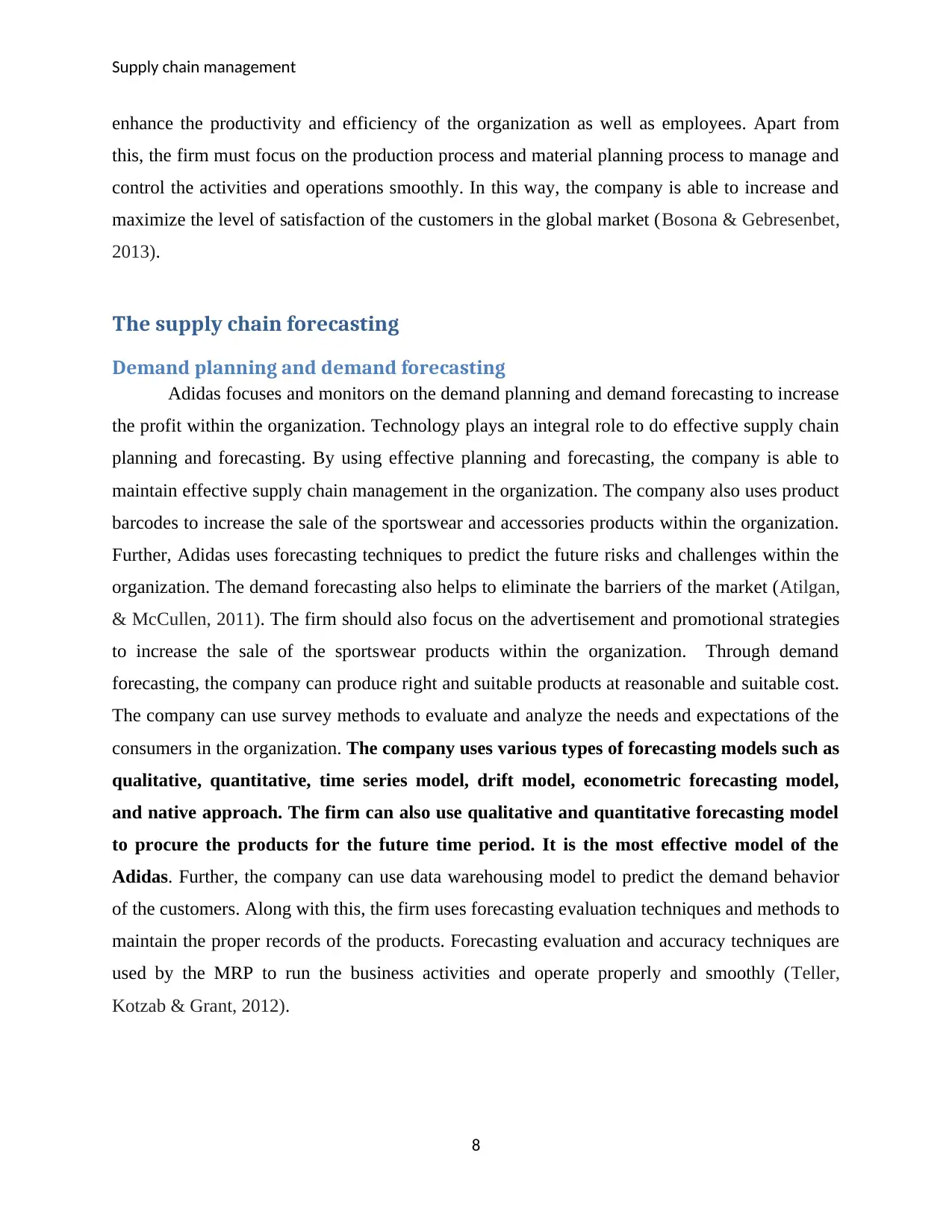
Supply chain management
enhance the productivity and efficiency of the organization as well as employees. Apart from
this, the firm must focus on the production process and material planning process to manage and
control the activities and operations smoothly. In this way, the company is able to increase and
maximize the level of satisfaction of the customers in the global market (Bosona & Gebresenbet,
2013).
The supply chain forecasting
Demand planning and demand forecasting
Adidas focuses and monitors on the demand planning and demand forecasting to increase
the profit within the organization. Technology plays an integral role to do effective supply chain
planning and forecasting. By using effective planning and forecasting, the company is able to
maintain effective supply chain management in the organization. The company also uses product
barcodes to increase the sale of the sportswear and accessories products within the organization.
Further, Adidas uses forecasting techniques to predict the future risks and challenges within the
organization. The demand forecasting also helps to eliminate the barriers of the market (Atilgan,
& McCullen, 2011). The firm should also focus on the advertisement and promotional strategies
to increase the sale of the sportswear products within the organization. Through demand
forecasting, the company can produce right and suitable products at reasonable and suitable cost.
The company can use survey methods to evaluate and analyze the needs and expectations of the
consumers in the organization. The company uses various types of forecasting models such as
qualitative, quantitative, time series model, drift model, econometric forecasting model,
and native approach. The firm can also use qualitative and quantitative forecasting model
to procure the products for the future time period. It is the most effective model of the
Adidas. Further, the company can use data warehousing model to predict the demand behavior
of the customers. Along with this, the firm uses forecasting evaluation techniques and methods to
maintain the proper records of the products. Forecasting evaluation and accuracy techniques are
used by the MRP to run the business activities and operate properly and smoothly (Teller,
Kotzab & Grant, 2012).
8
enhance the productivity and efficiency of the organization as well as employees. Apart from
this, the firm must focus on the production process and material planning process to manage and
control the activities and operations smoothly. In this way, the company is able to increase and
maximize the level of satisfaction of the customers in the global market (Bosona & Gebresenbet,
2013).
The supply chain forecasting
Demand planning and demand forecasting
Adidas focuses and monitors on the demand planning and demand forecasting to increase
the profit within the organization. Technology plays an integral role to do effective supply chain
planning and forecasting. By using effective planning and forecasting, the company is able to
maintain effective supply chain management in the organization. The company also uses product
barcodes to increase the sale of the sportswear and accessories products within the organization.
Further, Adidas uses forecasting techniques to predict the future risks and challenges within the
organization. The demand forecasting also helps to eliminate the barriers of the market (Atilgan,
& McCullen, 2011). The firm should also focus on the advertisement and promotional strategies
to increase the sale of the sportswear products within the organization. Through demand
forecasting, the company can produce right and suitable products at reasonable and suitable cost.
The company can use survey methods to evaluate and analyze the needs and expectations of the
consumers in the organization. The company uses various types of forecasting models such as
qualitative, quantitative, time series model, drift model, econometric forecasting model,
and native approach. The firm can also use qualitative and quantitative forecasting model
to procure the products for the future time period. It is the most effective model of the
Adidas. Further, the company can use data warehousing model to predict the demand behavior
of the customers. Along with this, the firm uses forecasting evaluation techniques and methods to
maintain the proper records of the products. Forecasting evaluation and accuracy techniques are
used by the MRP to run the business activities and operate properly and smoothly (Teller,
Kotzab & Grant, 2012).
8
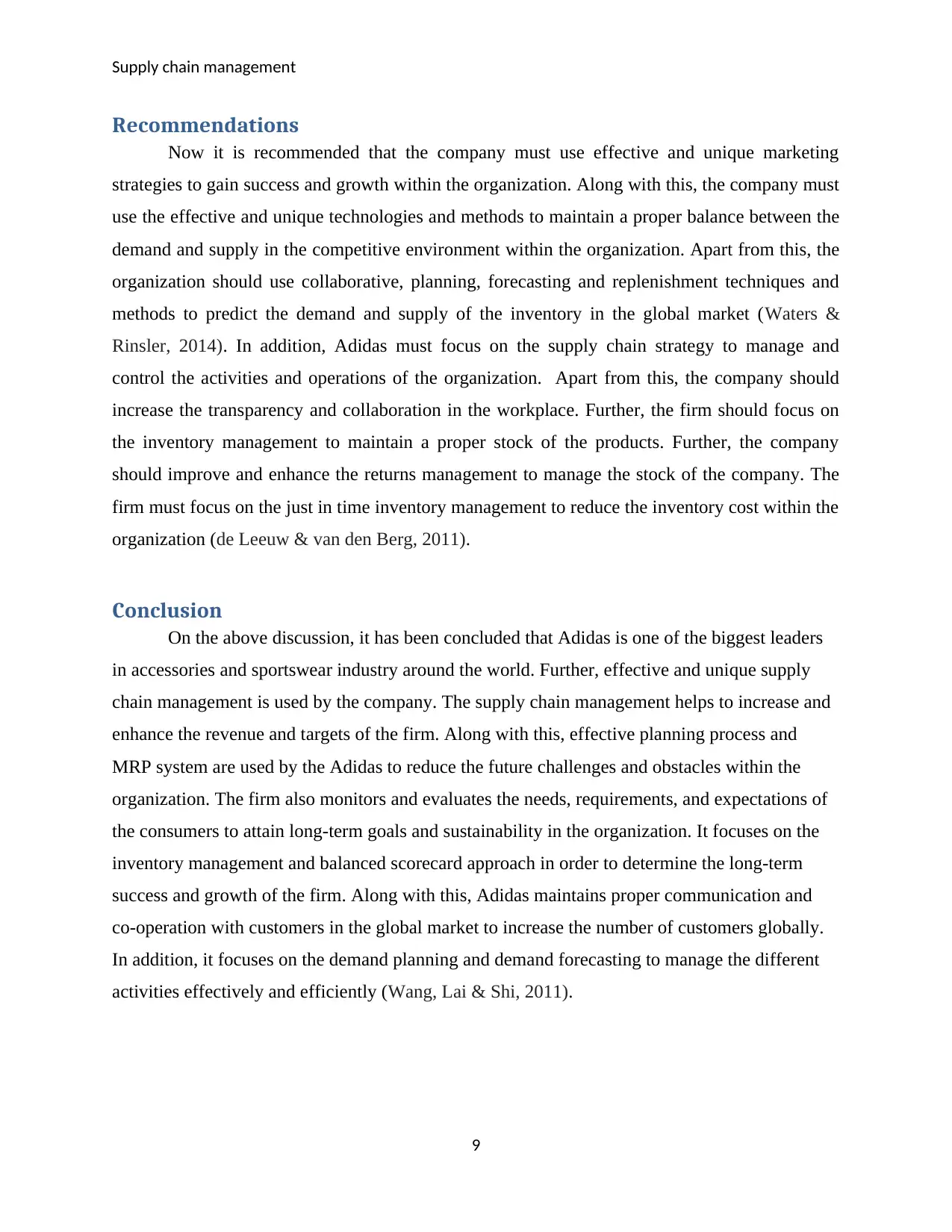
Supply chain management
Recommendations
Now it is recommended that the company must use effective and unique marketing
strategies to gain success and growth within the organization. Along with this, the company must
use the effective and unique technologies and methods to maintain a proper balance between the
demand and supply in the competitive environment within the organization. Apart from this, the
organization should use collaborative, planning, forecasting and replenishment techniques and
methods to predict the demand and supply of the inventory in the global market (Waters &
Rinsler, 2014). In addition, Adidas must focus on the supply chain strategy to manage and
control the activities and operations of the organization. Apart from this, the company should
increase the transparency and collaboration in the workplace. Further, the firm should focus on
the inventory management to maintain a proper stock of the products. Further, the company
should improve and enhance the returns management to manage the stock of the company. The
firm must focus on the just in time inventory management to reduce the inventory cost within the
organization (de Leeuw & van den Berg, 2011).
Conclusion
On the above discussion, it has been concluded that Adidas is one of the biggest leaders
in accessories and sportswear industry around the world. Further, effective and unique supply
chain management is used by the company. The supply chain management helps to increase and
enhance the revenue and targets of the firm. Along with this, effective planning process and
MRP system are used by the Adidas to reduce the future challenges and obstacles within the
organization. The firm also monitors and evaluates the needs, requirements, and expectations of
the consumers to attain long-term goals and sustainability in the organization. It focuses on the
inventory management and balanced scorecard approach in order to determine the long-term
success and growth of the firm. Along with this, Adidas maintains proper communication and
co-operation with customers in the global market to increase the number of customers globally.
In addition, it focuses on the demand planning and demand forecasting to manage the different
activities effectively and efficiently (Wang, Lai & Shi, 2011).
9
Recommendations
Now it is recommended that the company must use effective and unique marketing
strategies to gain success and growth within the organization. Along with this, the company must
use the effective and unique technologies and methods to maintain a proper balance between the
demand and supply in the competitive environment within the organization. Apart from this, the
organization should use collaborative, planning, forecasting and replenishment techniques and
methods to predict the demand and supply of the inventory in the global market (Waters &
Rinsler, 2014). In addition, Adidas must focus on the supply chain strategy to manage and
control the activities and operations of the organization. Apart from this, the company should
increase the transparency and collaboration in the workplace. Further, the firm should focus on
the inventory management to maintain a proper stock of the products. Further, the company
should improve and enhance the returns management to manage the stock of the company. The
firm must focus on the just in time inventory management to reduce the inventory cost within the
organization (de Leeuw & van den Berg, 2011).
Conclusion
On the above discussion, it has been concluded that Adidas is one of the biggest leaders
in accessories and sportswear industry around the world. Further, effective and unique supply
chain management is used by the company. The supply chain management helps to increase and
enhance the revenue and targets of the firm. Along with this, effective planning process and
MRP system are used by the Adidas to reduce the future challenges and obstacles within the
organization. The firm also monitors and evaluates the needs, requirements, and expectations of
the consumers to attain long-term goals and sustainability in the organization. It focuses on the
inventory management and balanced scorecard approach in order to determine the long-term
success and growth of the firm. Along with this, Adidas maintains proper communication and
co-operation with customers in the global market to increase the number of customers globally.
In addition, it focuses on the demand planning and demand forecasting to manage the different
activities effectively and efficiently (Wang, Lai & Shi, 2011).
9
⊘ This is a preview!⊘
Do you want full access?
Subscribe today to unlock all pages.

Trusted by 1+ million students worldwide
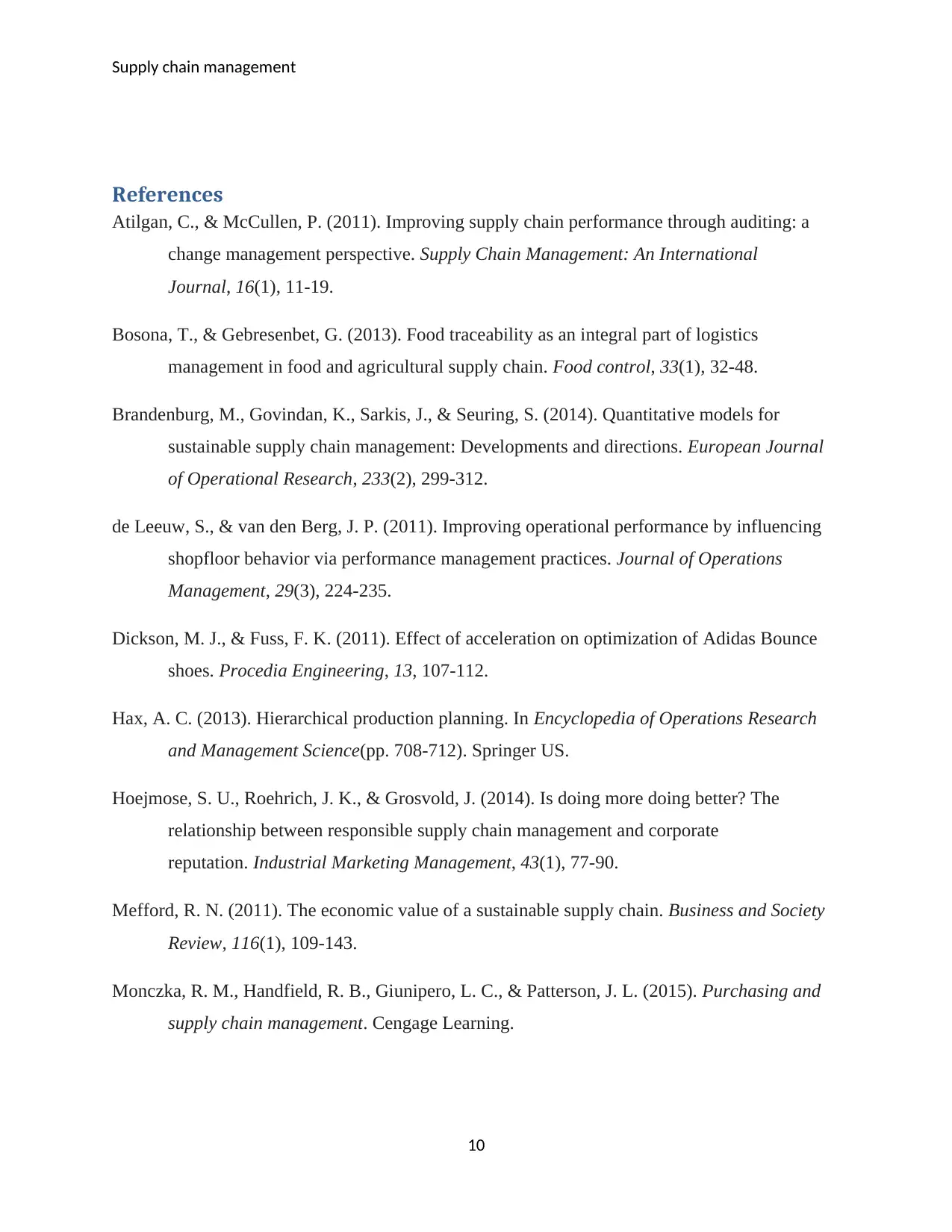
Supply chain management
References
Atilgan, C., & McCullen, P. (2011). Improving supply chain performance through auditing: a
change management perspective. Supply Chain Management: An International
Journal, 16(1), 11-19.
Bosona, T., & Gebresenbet, G. (2013). Food traceability as an integral part of logistics
management in food and agricultural supply chain. Food control, 33(1), 32-48.
Brandenburg, M., Govindan, K., Sarkis, J., & Seuring, S. (2014). Quantitative models for
sustainable supply chain management: Developments and directions. European Journal
of Operational Research, 233(2), 299-312.
de Leeuw, S., & van den Berg, J. P. (2011). Improving operational performance by influencing
shopfloor behavior via performance management practices. Journal of Operations
Management, 29(3), 224-235.
Dickson, M. J., & Fuss, F. K. (2011). Effect of acceleration on optimization of Adidas Bounce
shoes. Procedia Engineering, 13, 107-112.
Hax, A. C. (2013). Hierarchical production planning. In Encyclopedia of Operations Research
and Management Science(pp. 708-712). Springer US.
Hoejmose, S. U., Roehrich, J. K., & Grosvold, J. (2014). Is doing more doing better? The
relationship between responsible supply chain management and corporate
reputation. Industrial Marketing Management, 43(1), 77-90.
Mefford, R. N. (2011). The economic value of a sustainable supply chain. Business and Society
Review, 116(1), 109-143.
Monczka, R. M., Handfield, R. B., Giunipero, L. C., & Patterson, J. L. (2015). Purchasing and
supply chain management. Cengage Learning.
10
References
Atilgan, C., & McCullen, P. (2011). Improving supply chain performance through auditing: a
change management perspective. Supply Chain Management: An International
Journal, 16(1), 11-19.
Bosona, T., & Gebresenbet, G. (2013). Food traceability as an integral part of logistics
management in food and agricultural supply chain. Food control, 33(1), 32-48.
Brandenburg, M., Govindan, K., Sarkis, J., & Seuring, S. (2014). Quantitative models for
sustainable supply chain management: Developments and directions. European Journal
of Operational Research, 233(2), 299-312.
de Leeuw, S., & van den Berg, J. P. (2011). Improving operational performance by influencing
shopfloor behavior via performance management practices. Journal of Operations
Management, 29(3), 224-235.
Dickson, M. J., & Fuss, F. K. (2011). Effect of acceleration on optimization of Adidas Bounce
shoes. Procedia Engineering, 13, 107-112.
Hax, A. C. (2013). Hierarchical production planning. In Encyclopedia of Operations Research
and Management Science(pp. 708-712). Springer US.
Hoejmose, S. U., Roehrich, J. K., & Grosvold, J. (2014). Is doing more doing better? The
relationship between responsible supply chain management and corporate
reputation. Industrial Marketing Management, 43(1), 77-90.
Mefford, R. N. (2011). The economic value of a sustainable supply chain. Business and Society
Review, 116(1), 109-143.
Monczka, R. M., Handfield, R. B., Giunipero, L. C., & Patterson, J. L. (2015). Purchasing and
supply chain management. Cengage Learning.
10
Paraphrase This Document
Need a fresh take? Get an instant paraphrase of this document with our AI Paraphraser
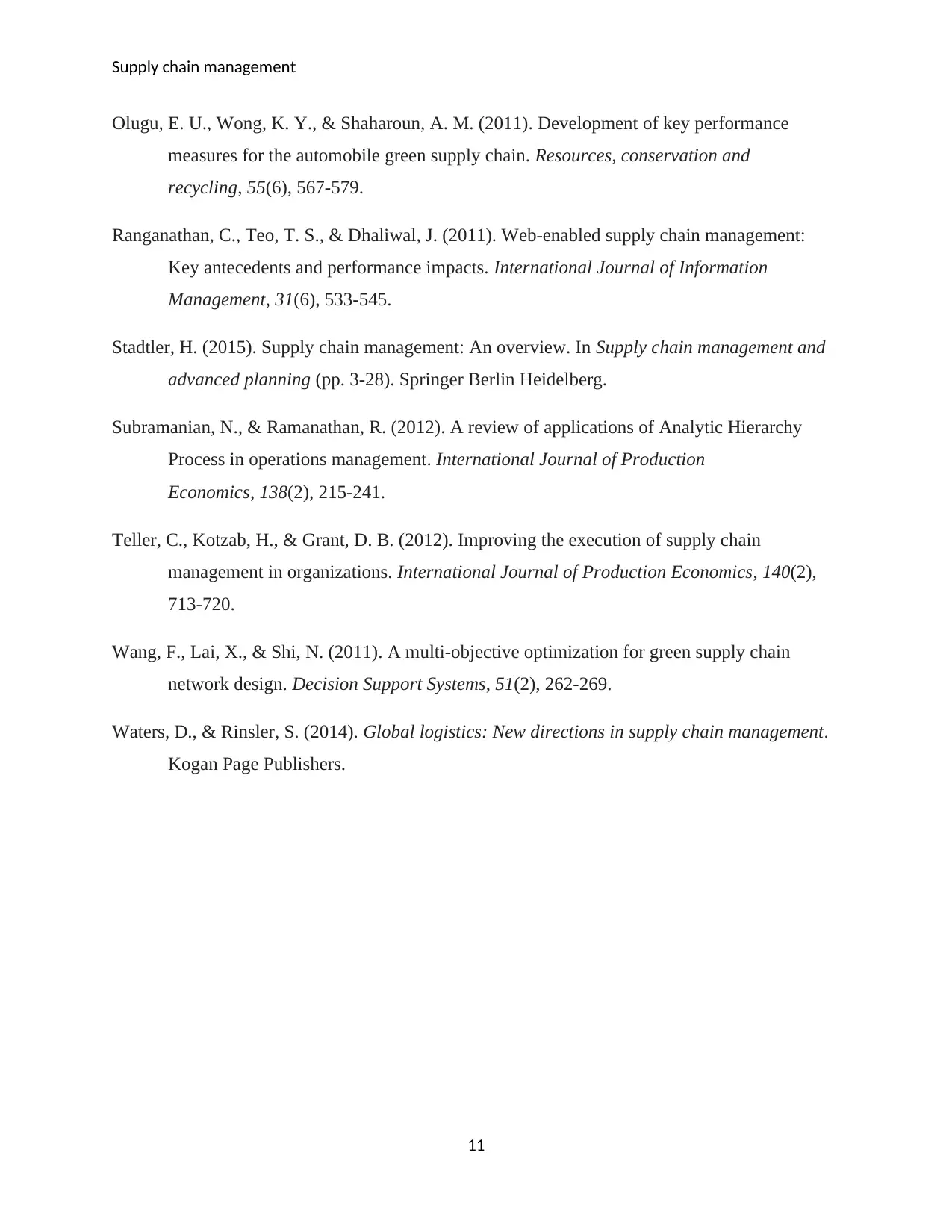
Supply chain management
Olugu, E. U., Wong, K. Y., & Shaharoun, A. M. (2011). Development of key performance
measures for the automobile green supply chain. Resources, conservation and
recycling, 55(6), 567-579.
Ranganathan, C., Teo, T. S., & Dhaliwal, J. (2011). Web-enabled supply chain management:
Key antecedents and performance impacts. International Journal of Information
Management, 31(6), 533-545.
Stadtler, H. (2015). Supply chain management: An overview. In Supply chain management and
advanced planning (pp. 3-28). Springer Berlin Heidelberg.
Subramanian, N., & Ramanathan, R. (2012). A review of applications of Analytic Hierarchy
Process in operations management. International Journal of Production
Economics, 138(2), 215-241.
Teller, C., Kotzab, H., & Grant, D. B. (2012). Improving the execution of supply chain
management in organizations. International Journal of Production Economics, 140(2),
713-720.
Wang, F., Lai, X., & Shi, N. (2011). A multi-objective optimization for green supply chain
network design. Decision Support Systems, 51(2), 262-269.
Waters, D., & Rinsler, S. (2014). Global logistics: New directions in supply chain management.
Kogan Page Publishers.
11
Olugu, E. U., Wong, K. Y., & Shaharoun, A. M. (2011). Development of key performance
measures for the automobile green supply chain. Resources, conservation and
recycling, 55(6), 567-579.
Ranganathan, C., Teo, T. S., & Dhaliwal, J. (2011). Web-enabled supply chain management:
Key antecedents and performance impacts. International Journal of Information
Management, 31(6), 533-545.
Stadtler, H. (2015). Supply chain management: An overview. In Supply chain management and
advanced planning (pp. 3-28). Springer Berlin Heidelberg.
Subramanian, N., & Ramanathan, R. (2012). A review of applications of Analytic Hierarchy
Process in operations management. International Journal of Production
Economics, 138(2), 215-241.
Teller, C., Kotzab, H., & Grant, D. B. (2012). Improving the execution of supply chain
management in organizations. International Journal of Production Economics, 140(2),
713-720.
Wang, F., Lai, X., & Shi, N. (2011). A multi-objective optimization for green supply chain
network design. Decision Support Systems, 51(2), 262-269.
Waters, D., & Rinsler, S. (2014). Global logistics: New directions in supply chain management.
Kogan Page Publishers.
11
1 out of 11
Related Documents
Your All-in-One AI-Powered Toolkit for Academic Success.
+13062052269
info@desklib.com
Available 24*7 on WhatsApp / Email
![[object Object]](/_next/static/media/star-bottom.7253800d.svg)
Unlock your academic potential
Copyright © 2020–2025 A2Z Services. All Rights Reserved. Developed and managed by ZUCOL.





